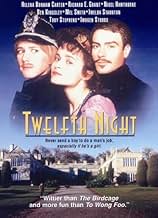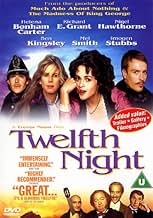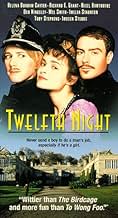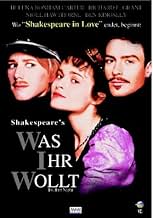IMDb RATING
7.1/10
6.6K
YOUR RATING
Shakespeare's comedy of gender confusion, in which a girl disguises herself as a man to be near the count she adores, only to be pursued by the woman he loves.Shakespeare's comedy of gender confusion, in which a girl disguises herself as a man to be near the count she adores, only to be pursued by the woman he loves.Shakespeare's comedy of gender confusion, in which a girl disguises herself as a man to be near the count she adores, only to be pursued by the woman he loves.
- Director
- Writers
- Stars
- Awards
- 1 win & 2 nominations total
Sidney Livingstone
- Captain
- (as Sid Livingstone)
David Burke
- Party Guest
- (uncredited)
- …
- Director
- Writers
- All cast & crew
- Production, box office & more at IMDbPro
Featured reviews
A lively, bubbly production of one of Shakespeare's more difficult plays. It's hard to know just what Shakespeare was getting at with this story. The text doesn't always seem to make sense. That's reflected in this, as well as any other, production. At times, one wonders what the expressions on characters' faces are meant to indicate. Just after Feste has fooled Malvolio with his imitation of the curate, for instance, Maria has a perturbed look on her face. As if the joke that she herself so elaborately designed now troubles her. There's nothing in the text to indicate that her expression should show remorse; and yet Sir Toby soon after says that he's sick of the whole thing. Why? That's one example of the difficulty of the text (which may have been corrupted over the centuries), and how it is manifested in this particular production's choices. I don't know why Sir Toby remarks at this point that he's sick of the joke, nor do I know whether Maria should share his feelings.
Another difficulty is the role of Feste. Ben Kingsley fills this role, and because Ben Kingsley is a major star, he magnifies this character (in my opinion) out of all proportion. He becomes a sort of Zen master, pompous and oppressive. His jokes aren't funny (maybe we can't find Shakespeare's jokes funny today, but Kingsley's heavy delivery precludes humor), and his last confrontation with Malvolio comes off as a sort of thundering divine retribution. The entire play, the entire cast, stops dead and Feste takes over as if the whole point of the play has been his apotheosis at the expense of the degraded Malvolio. This surely cannot be what Shakespeare had in mind. Throughout the play he has a disconcerting habit of staring at other characters or the camera with what almost be described as a leer.
Maybe Shakespeare would have sighed and commiserated with the producer of this film, because the clowns in his day were also big stars who demanded a lot of meat in their roles. The trouble is that there just isn't much meat in Feste's role according to the text, so we're stuck with leers and thundering retribution and other inventions. Shakespeare had to accommodate his clowns with ever-more important roles, climaxing with characters like Touchstone and Lear's fool. Kingsley is just inventing his own character. At times his work is interesting, but his weight in the production is, as I said, oppressive.
Still, his screen time is relatively small, and much of the rest of the play is a joy, even if the point of the story isn't always clear. Bonham-Carter was never more alluring, Hawthorne is priceless as Malvolio (he was born for the role), and Smith and Grant are the perfect combination of Belch and Aguecheek. I suppose you might object that all four of them put their eyebrows to such prodigious use that their acting might be characterized as hamming. But I don't see how any of these characters can be played straight if the play is to work.
One thing is for sure, no one would ever accuse this production of bogging down. The pace is lively, the sets and the cinematography are always striking, the score is invigorating, and I suspect that I could watch this film dubbed in Swahili and it would still be a lot of fun. Visually arresting is perhaps the best description.
Another difficulty is the role of Feste. Ben Kingsley fills this role, and because Ben Kingsley is a major star, he magnifies this character (in my opinion) out of all proportion. He becomes a sort of Zen master, pompous and oppressive. His jokes aren't funny (maybe we can't find Shakespeare's jokes funny today, but Kingsley's heavy delivery precludes humor), and his last confrontation with Malvolio comes off as a sort of thundering divine retribution. The entire play, the entire cast, stops dead and Feste takes over as if the whole point of the play has been his apotheosis at the expense of the degraded Malvolio. This surely cannot be what Shakespeare had in mind. Throughout the play he has a disconcerting habit of staring at other characters or the camera with what almost be described as a leer.
Maybe Shakespeare would have sighed and commiserated with the producer of this film, because the clowns in his day were also big stars who demanded a lot of meat in their roles. The trouble is that there just isn't much meat in Feste's role according to the text, so we're stuck with leers and thundering retribution and other inventions. Shakespeare had to accommodate his clowns with ever-more important roles, climaxing with characters like Touchstone and Lear's fool. Kingsley is just inventing his own character. At times his work is interesting, but his weight in the production is, as I said, oppressive.
Still, his screen time is relatively small, and much of the rest of the play is a joy, even if the point of the story isn't always clear. Bonham-Carter was never more alluring, Hawthorne is priceless as Malvolio (he was born for the role), and Smith and Grant are the perfect combination of Belch and Aguecheek. I suppose you might object that all four of them put their eyebrows to such prodigious use that their acting might be characterized as hamming. But I don't see how any of these characters can be played straight if the play is to work.
One thing is for sure, no one would ever accuse this production of bogging down. The pace is lively, the sets and the cinematography are always striking, the score is invigorating, and I suspect that I could watch this film dubbed in Swahili and it would still be a lot of fun. Visually arresting is perhaps the best description.
In writing Twelfth Night (and the same goes for many other of his romantic comedies), Shakespeare showed that he was not only a genius at dark tragedy but also at light comedy. I saw a junior college production of this play which did live up to Shakespeare's intentions, which was in fact so funny I was falling off my chair.
Unfortunately, director Nunn will not allow a hilarious slapstick comedy to just be a hilarious slapstick comedy. Apparently he succumbed to the notion that everything Shakespearean has somehow to seem profound, which in this case results in an attempt to transfer this light, sparkling comedy, full of deliberately overdrawn characters and silly lines and pratfalls, into a brooding tragedy in which pompous ass Malvolio acts as if he were, or imagined himself to be, Hamlet caught in the wrong play, while clown Feste is misanthropic to the point of sadism. There is no suggestion of comic timing anywhere in this film!
It appears that once Nunn decided to insist on a modern-dress version, he adopted as his mentor the let's-portray-the-messed-up-dysfunctional-household school. This is stupid. A better mentor would have been a closer modern equivalent of what Shakespeare was doing in this play. Something like I Love Lucy or Amos 'n' Andy or The Honeymooners, in other words.
One thing that entirely puzzles me is: why the devil didn't Nunn exploit the particular advantages of the cinema in depicting this gender-bender story of a girl impersonating a look-alike boy? Why in sam hill didn't Nunn have a male actor who is skilled at female impersonation, or an actress skilled at impersonating males, play both roles on a split screen? (See, for the sort of impersonation I refer to, Vanessa Redgrave as the trans-sexual tennis player in Second Serve.) In other words: Why transform a stage play into a film at all, if you're not going to put the advantages of the cinema, as opposed to those of the stage, to work? Nunn's treatment of this play is not only a mangled interpretation, it's unimaginative.
Ben Kingsley is the only performer who does very much with his part, and what he does he does very well. His acting creates a very interesting character, and his interpretation of Feste is certainly consistent, but it receives no support whatsoever from the text.
Unfortunately, director Nunn will not allow a hilarious slapstick comedy to just be a hilarious slapstick comedy. Apparently he succumbed to the notion that everything Shakespearean has somehow to seem profound, which in this case results in an attempt to transfer this light, sparkling comedy, full of deliberately overdrawn characters and silly lines and pratfalls, into a brooding tragedy in which pompous ass Malvolio acts as if he were, or imagined himself to be, Hamlet caught in the wrong play, while clown Feste is misanthropic to the point of sadism. There is no suggestion of comic timing anywhere in this film!
It appears that once Nunn decided to insist on a modern-dress version, he adopted as his mentor the let's-portray-the-messed-up-dysfunctional-household school. This is stupid. A better mentor would have been a closer modern equivalent of what Shakespeare was doing in this play. Something like I Love Lucy or Amos 'n' Andy or The Honeymooners, in other words.
One thing that entirely puzzles me is: why the devil didn't Nunn exploit the particular advantages of the cinema in depicting this gender-bender story of a girl impersonating a look-alike boy? Why in sam hill didn't Nunn have a male actor who is skilled at female impersonation, or an actress skilled at impersonating males, play both roles on a split screen? (See, for the sort of impersonation I refer to, Vanessa Redgrave as the trans-sexual tennis player in Second Serve.) In other words: Why transform a stage play into a film at all, if you're not going to put the advantages of the cinema, as opposed to those of the stage, to work? Nunn's treatment of this play is not only a mangled interpretation, it's unimaginative.
Ben Kingsley is the only performer who does very much with his part, and what he does he does very well. His acting creates a very interesting character, and his interpretation of Feste is certainly consistent, but it receives no support whatsoever from the text.
This is, quite simply, the best production of a Shakespeare comedy ever filmed. The plot is delightfully absurd, the acting brilliant, the direction superb. It is the sort of comedy you can watch over and over again.
Slick Shakespeare adaptation, well acted and very humorous (in parts) in its telling. Naturally, there's always going to be some differences from stage to cinema. The film took advantage of this, of course, to avoid a "stage" feel. The perceptions, or rather the misperceptions, of people and motivations are well explored and portrayed. Ben Kingsley is a standout, for his interesting twist on the character Feste. In short, a good adaptation and film. Recommended.
Trevor Nunn's beautifully photographed and acted, deftly written film is one of the most enjoyable adaptations of a Shakespeare play ever made. Helena Bonham Carter is pitch perfect as the beautiful Olivia, who in "deep mourning" for her dead brother, falls in love with Cesario (who happens to be a woman named Viola dressed up as a man, wonderfully played by Imogen Stubbs, the only actress I've ever seen able to create both a charming Viola and a totally believable Cesario), meanwhile Viola falls for the Duke of fictional Illyria (the exquisite Toby Stephens) who is desperately in love with the Lady Olivia. Meanwhile, Viola's lost twin brother (Steven Mackintosh of "Gentlemen Don't Eat Poets", excellent again here) winds up in Illyria and adds to the confusion. Wonderful, layered support comes from Ben Kingsley playing Feste, Olivia's fool. The only flaw, perhaps, is the few minutes before the conclusion when everything seems to be coated with a thick gloss of sugar; the film comes through this unscathed. Trevor Nunn comes through with an exquisite Shakespeare film adaptation (which is a do or die task). A great showcase for the heavenly cast featuring some of the best performances ever by Bonham Carter (save "Wings of the Dove"), Kingsley (in his best supporting turn ever), novice Stubbs, and Stephens. A very worthwhile effort. Rent it, you won't be let down.
Did you know
- TriviaIn the mid 1950s, director Joseph L. Mankiewicz tried to set up a version with Audrey Hepburn and Danny Kaye, but it failed to materialize.
- GoofsFeste's guitar playing for Cesario (Viola) and Orsino does not match up with the soundtrack.
- How long is Twelfth Night?Powered by Alexa
Details
- Release date
- Countries of origin
- Official site
- Language
- Also known as
- Twelfth Night
- Filming locations
- Lanhydrock House, Bodmin, Cornwall, England, UK(Olivia's house and garden)
- Production companies
- See more company credits at IMDbPro
Box office
- Budget
- $5,000,000 (estimated)
- Gross US & Canada
- $588,621
- Opening weekend US & Canada
- $33,451
- Oct 27, 1996
- Gross worldwide
- $588,621
Contribute to this page
Suggest an edit or add missing content





































